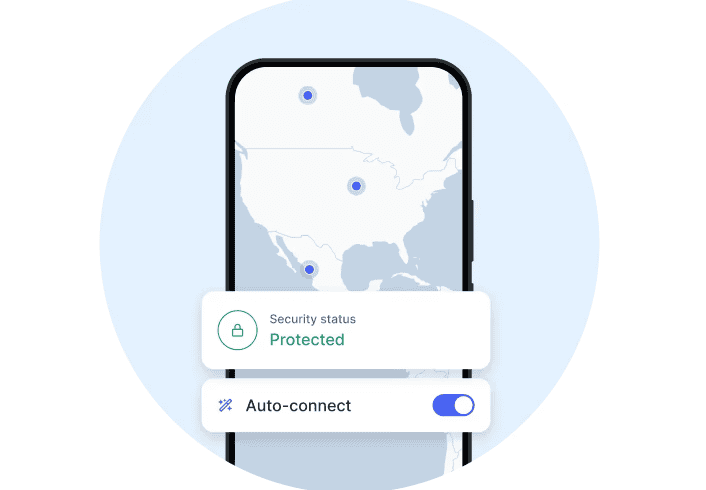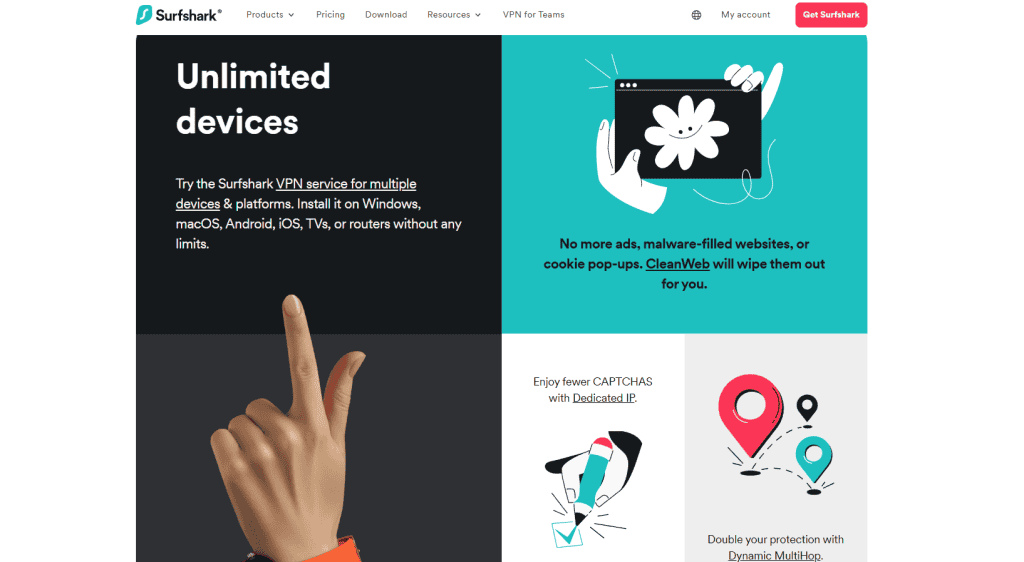As your ecommerce business grows, so do the threats that lurk online.
Every day, hackers scour the internet for stores like yours, eager to steal card details, take sites offline, or spy on supplier emails.
The good news? You don’t need to be a tech guru to defend yourself.
A VPN is one of the simplest, most affordable tools to keep your ecommerce business safe.
Over the next few minutes, you’ll see why a VPN isn’t just nice to have.
Let’s dive in.
What is a VPN?
VPN stands for Virtual Private Network, and its primary job is to protect your online activities from being monitored or intercepted by others.
Here’s how it works:
When you connect to the Internet without protection, your data, such as passwords, credit card details, or customer information, is sent openly and can potentially be viewed by anyone skilled enough to access it.
A VPN encrypts your internet traffic and hides your IP address, making it much harder for hackers or third parties to spy on your activity.
A good way to understand a VPN is to imagine it as your private checkout counter at a busy store:
Your internet data passes securely through this ‘checkout,’ hidden from others who might want to peek or steal sensitive information.
Why security matters in ecommerce
You might wonder why security should be a top priority, especially if your store isn’t a big name.
Unfortunately, cyber threats don’t discriminate based on the size of your business.
Small to medium-sized online stores are frequent targets precisely because they’re often less protected.
Here are a few common examples of attacks:
- Phishing attacks. Hackers send deceptive emails or messages pretending to be legitimate to trick you or your customers into revealing passwords or financial information.
- Credit card theft. Hackers intercept payment details during online transactions, leading to financial loss and compromised customer accounts.
- DDoS attacks. Distributed Denial of Service (DDoS) attacks flood your website with fake traffic, causing your store to crash and become inaccessible to genuine customers.
To put this into perspective, traditional businesses worry about physical theft, fire, or property damage.
In contrast, ecommerce and dropshipping stores face digital threats that can happen instantly and without warning.
That’s why proactive online security measures like a VPN are critical to safeguarding your business.
9 Reasons you need a VPN for your ecommerce store
Here are nine practical reasons why you need a VPN for your online store:
1. Stay secure on public Wi-Fi
As an ecommerce entrepreneur (especially a dropshipper), you probably work from various public places such as cafés, airports, or co-working spaces.

However, public Wi-Fi networks are notoriously insecure, making them a favorite hunting ground for cybercriminals.
Without proper protection, hackers can easily ‘eavesdrop’ on your online activities and capture login credentials, payment details, and other sensitive data.
A VPN mitigates these risks by establishing a secure, encrypted connection between your device and the internet.
For instance, imagine you’re traveling and urgently need to access your online store to process customer orders.
Connecting through a public Wi-Fi without a VPN could expose critical business data, whereas using a VPN ensures everything you do online remains private, keeping your store and customers safe.
2. Enables secure remote work
If you rely on remote teams or virtual assistants based around the globe, you should definitely think about upping your security game.
While remote work is convenient, it also brings additional security risks since team members access your online store from various networks, some of which may not be secure.
For example, if your virtual assistant logs into your Shopify or WooCommerce store dashboard from an insecure home network, there’s a risk of unauthorized access or data leakage.

Using a VPN secures these remote connections, ensuring your operations continue smoothly and securely, regardless of team members’ locations.
3. Protect customer and supplier conversations
Your ecommerce business routinely involves sensitive communications with suppliers, distributors, and customers.
When you discuss prices, manage stock, or share customer details, you’re handling confidential information that, if leaked, could hurt your competitive position or your reputation.
A VPN encrypts these important communications, keeping them private and stopping spying or accidental leaks.

For example, sending detailed customer orders or exclusive supply chain information without protection can leave you open to business spying.
A VPN ensures these key messages stay secret, protecting your partnerships and competitive edge.
4. Test and optimize for international customers
To run a successful global ecommerce business, you need to understand how your website and services appear to users in different regions.
Many ecommerce platforms, ad services, or payment gateways may show region-specific content, currencies, or experiences.
A VPN allows you to virtually ‘appear’ in different countries, giving you the freedom to operate without geographic limitations.
You can then simulate user access from different countries, test localization features, and ensure smooth operation across all regions.

5. Avoids bandwidth throttling by ISPs
Internet Service Providers (ISPs) frequently slow down connections when they spot heavy activity, such as large file uploads, constant dashboard polling, or bulk data syncs during peak hours.
That can hamper your ability to update product listings, push theme changes, or monitor live sales.
A VPN encrypts and masks your traffic, so your ISP can’t distinguish and throttle those store-management tasks, keeping your backend workflows fast and reliable.
Note: A VPN on your end won’t speed up your customers’ browsing, so it still requires CDNs and server optimizations.
6. Adds a layer of anonymity for competitive research
To stay competitive in ecommerce, you must constantly check the market, including competitors’ prices, product lines, and strategies.
But competitors can track your IP address and block you if they notice you visiting their site too often.

A VPN masks your real IP address so you can research your competition without being spotted or shut out.
You get uninterrupted access to key information like pricing and stock levels, all while staying under the radar.
7. Access critical tools blocked in your country
Sometimes, local authorities or ISPs block access to websites or online services that are essential for ecommerce operations, including social media, marketing tools, or ecommerce platforms.
A VPN helps you bypass those local blocks by routing your connection through servers in unrestricted regions.
This lets you maintain uninterrupted access to the tools necessary to run your business.
Note: While a VPN can help you bypass restrictions, we do not recommend using a VPN for activities that violate local laws or regulations, as authorities may track and penalize such actions.
8. Blocks malware
Many VPNs now include an ad and malware blocker that filters out trackers, pop-ups, and known malicious domains at the DNS level.
This means you’ll see fewer annoying ads when browsing supplier sites or managing customer chats, and you’re less likely to load a resource that accidentally drops malware onto your device.
Note: Not every VPN offers this service. Make sure to pick a provider that advertises built-in ad/malware protection.
9. Notifies you of data breach alerts
It’s one thing to lock down your store, but what if your login details have already leaked?
A few VPN providers now include a breach-notification service that scans dark web forums, paste sites, and stolen-data databases for your email or domain.
If your information turns up in a dump, you get an immediate alert to rotate passwords, enable MFA, or freeze compromised accounts before criminals strike.
Think of it like a credit-monitoring alert but for your business credentials.

Remember, these services only flag leaks they know about, so it’s still smart to run periodic password audits and use a vault with built-in breach checks.
Note: For best results, pair breach alerts with a strong password manager that can automatically generate new, unique passwords on the spot.
Choosing the right VPN for ecommerce
Selecting the right VPN service is crucial to protect your ecommerce business effectively.
What to look for

As you weigh your options, start with speed and performance
You need a VPN that delivers fast, rock-solid connections so product uploads, dashboard checks, and order updates never get bottlenecked, as no one has time to wait on a sluggish admin interface.
Privacy and reliability go hand in hand, so choose a provider with an independently audited no-logs policy.
That way, you know your browsing history and personal data stay private.
Also, look for built-in kill-switch and DNS-leak protection: if the VPN ever drops, your internet connection is cut, and your real IP stays hidden, keeping data from slipping out.
Since you’re likely jumping between a desktop, laptop, and phone, choose a plan that covers multiple devices, ideally unlimited or generous simultaneous connections.
This way, you can switch devices seamlessly without signing in and out.
Finally, make sure the VPN app is simple and intuitive, with one-click connect, easy server switching, and clear settings so you and your team actually use it every day.
Top features you should prioritize
To narrow down your choices, focus on:
- AES-256 Encryption. The gold standard for securing data in transit.
- Reliability and uptime. Any VPN outage can stall your operations, so choose a provider known for stable service.
- Global server coverage. A broad network across regions helps you test how your store appears to customers worldwide and bypass geo-blocks.
- No geo-restrictions. Comprehensive server availability across various regions helps maintain smooth and unrestricted access worldwide.
- SMB-friendly. Business-tier pricing and quick live chat or ticket support ensure you’re never left troubleshooting alone.
Beginner-friendly VPN services
Here are a few reliable VPN services suitable for beginners:
- NordVPN. Independently audited no-logs policy, AES-256, kill switch, DNS-leak protection, huge server network, and user-friendly apps.
- ExpressVPN. Fast speeds, strong privacy protections, excellent global coverage, an intuitive interface, and 24/7 live-chat support.
- Surfshark. Budget-friendly unlimited device connections, solid security features, built-in kill switch, and straightforward setup.
How to Set Up a VPN (Basic guide)

Setting up a VPN for your ecommerce business is simple and typically involves these steps:
Quick walkthrough
- Sign up. Pick a VPN provider you trust and subscribe to a plan that fits your needs.
- Download. Install the VPN app on each device you use: desktop, laptop, smartphone, or tablet. Most providers also offer browser extensions, which you can add to Chrome, Firefox, or Edge.
- Connect. Open the VPN app or extension, log in, choose a server location, and hit ‘Connect.’ In just a few seconds, your traffic will be encrypted and private.
Tips for using a VPN
- Desktop. Keep the VPN on whenever you access your store’s backend, process payments, or make theme changes—any time you handle sensitive data.
- Mobile. Turn on the VPN for remote work tasks like mobile banking, order management, or secure messaging with customers and suppliers.
- Browser extensions. Use these for quick server switches during tasks like competitive research or testing geo-restricted features. Remember that extensions only protect traffic in that browser tab, not your entire device, so switch to the full app for complete coverage.
Summary
Before we go, we’ve created a quick summary of this article for you, so you can easily remember it:
- With a VPN, your store’s data and logins stay encrypted on any network, so hackers can’t intercept orders or payment details.
- Remote team members should connect through VPN to keep backend tasks safe, no matter where they work.
- You can spoof locations to test regional storefronts, access geo-restricted tools, and research competitors without being flagged.
- Many VPNs include ad/malware blocking at the DNS level and send alerts if your credentials appear on the dark web.
Final thoughts
A VPN is a simple, affordable way to lock down your data, protect your customers, and keep everything running smoothly.
Think of it like another everyday tool in your toolkit, just as important as your payment system or your supplier contacts.
By prioritizing basic security measures like using a VPN, you’re investing in the long-term success and sustainability of your ecommerce business.
Don’t wait for a hack to happen; add a VPN to your security strategy today.
Want to learn more about ecommerce?
Ready to move your online store to the next level? Check out the articles below:
Plus, don’t forget to check out our in-depth how to start an online store guide here.
